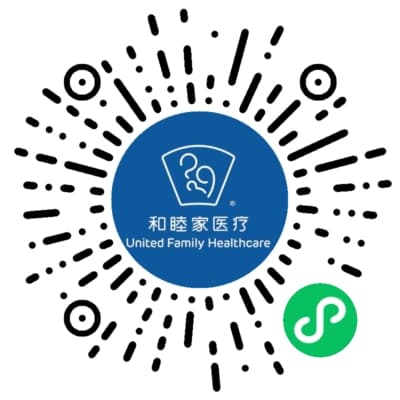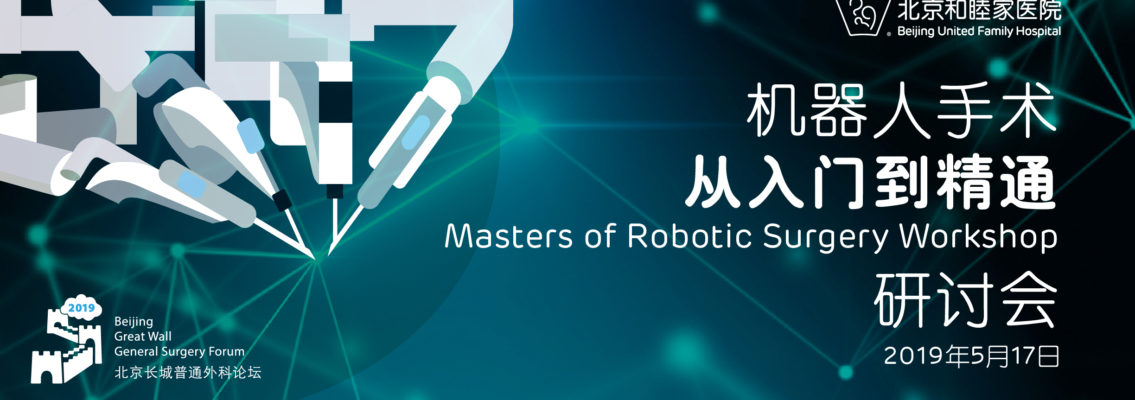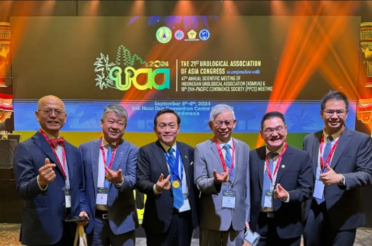When top surgery equipment attracts an excellent surgical team, this is a wise decision for the hospital administrators.
On May 17, the 2019 Beijing Great Wall General Surgery Forum: A Discussion on Robotic Surgery’s Journey from Introduction to Refinement was held in Beijing United Family Hospital (BJU). It marked the 4th anniversary of the introduction of the Da Vinci Robotic Surgical System to BJU, as well as the 4th year that the hospital has had live webcasts of Da Vinci robotic surgeries.
Ms. Sylvia Pan, the General Manager of BJU and UFH VP, believes that not only does the Da Vinci Robotic Surgical System train a surgical team for the hospital, it has also trained the management team. Ms. Pan described the changes as “night and day” in the last four years.

From left to right: Jeff Staples, COO of United Family Healthcare; Su Xiangqian, Vice President of Beijing Cancer Hospital; Professor Pier C. Giulianotti; Dr. Michelle Savu, Chief of General Surgery at BJU; Sylvia Pan, BJU General Manager; Sun Fei, Chief Medical Officer at BJU; Zhu Gang, Surgical Chief at BJU.
From Importing Talent to Exporting Technology
Just as racecar drivers prefer high-end race cars, surgeons prefer high-end surgical equipment. The Da Vinci Robotic Surgical System is one of the most advanced minimally-invasive surgical systems available today, combining high-resolution 3D view, movable surgical equipment, and instinctive movement control, enabling doctors to apply minimally-invasive technology to more complicated surgeries. Robotic surgeries help to reduce blood-loss during surgery, reduce post-surgery complications, speed up post-surgery recovery, reduce the duration of in-hospital stays, and significantly improve surgery efficiency as well as aesthetics.
For team-building at BJU’s surgery department, the Da Vinci Robotic Surgical System has proved to be pivotal. “It could be said that without Da Vinci surgical robots, we wouldn’t have the UFH surgical team today. Da Vinci was one of the important reasons I joined UFH”, recalled Dr. Zhu Gang, Surgical Chief at UFH, about his early days at the hospital.
Ever since BJU introduced the Da Vinci Robotic Surgical System in May 2015, it has been used in urology surgery, gastrointestinal surgery, hepatobiliary and pancreatic surgery, thyroid surgery, head and neck surgery, hernia and abdominal wall surgery, gynecological surgery, chest surgery, pediatric surgery, and other areas. As of today, nearly 350 surgeries have been completed.
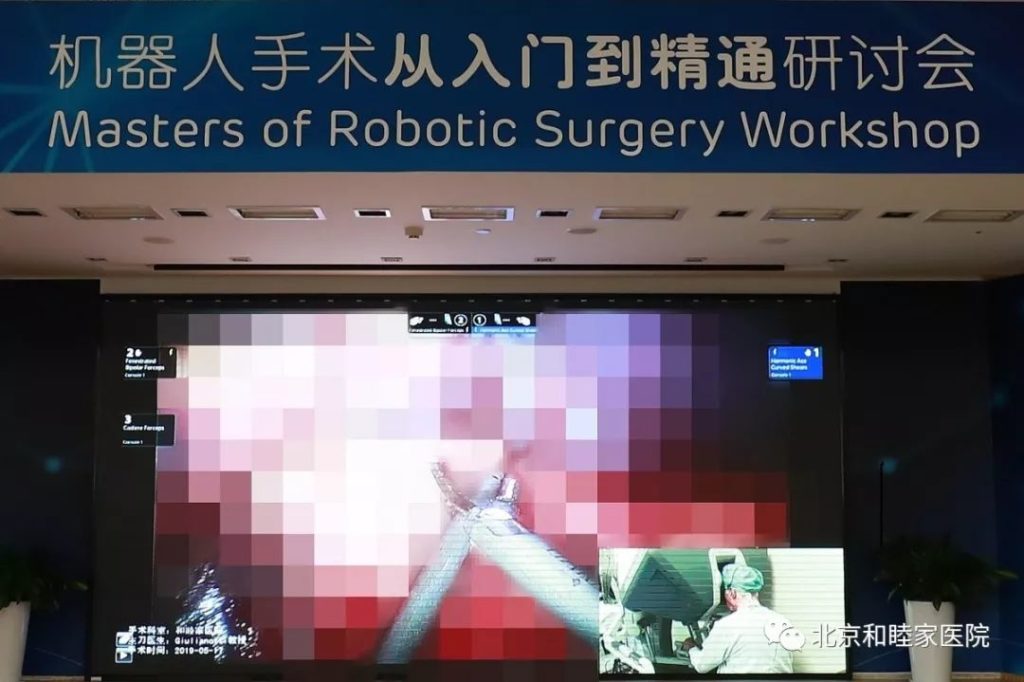
As the number of robotic surgical operations has grown, BJU has grown the depth and breadth of its surgical team. One of the most remarkable things is the live surgery webcast for the Da Vinci robotic system for the last four years.
Ms. Pan said the decision to webcast surgeries seems to have been an impulsive decision but it is in fact a targeted decision that has helped move BJU onto the surgical fast track. The decision was made in 2015, when webcast was just starting, to solve the problem of information asymmetry, the biggest potential risk of medical treatment.
When they decided to broadcast surgeries, the program was launched right away. During the first surgical broadcast, BJU’s online audience was around 85 thousand viewers, with 180 thousand replays and 3.97 million likes, the site actually reached number eight on Weibo’s Society List. In the second year, UFH chose to do an open-ended broadcast for both patients and doctors, not only reducing people’s lack of knowledge and revealing Da Vinci’s secrets, but also helping experts interpret the doctors’ techniques. In the third year of the broadcast, there were 620 thousand viewers, setting a new record. This year’s broadcast target is focused on doctors who are interested in and have a need for the Da Vinci system, with almost 10 thousand doctors watching on the day of the broadcast.
Robotic surgery broadcast has not only brought recognition to BJU, it has garnered attention from doctors. Unlike previous years, surgical video analysis at this year’s forum is done by BJU’s own surgeons. According to Ms. Pan, doctors could attend the forum for free and watch the surgeries because it is a type of technological export, which she calls the hospital’s soft power. Previously, a lot of technology export was done by public hospitals to private medical organizations, with the impression of the latter being they have good equipment, good service, but are technically weak. With BJU having a forum like this, private medical agencies now have a standard for high-end technology.
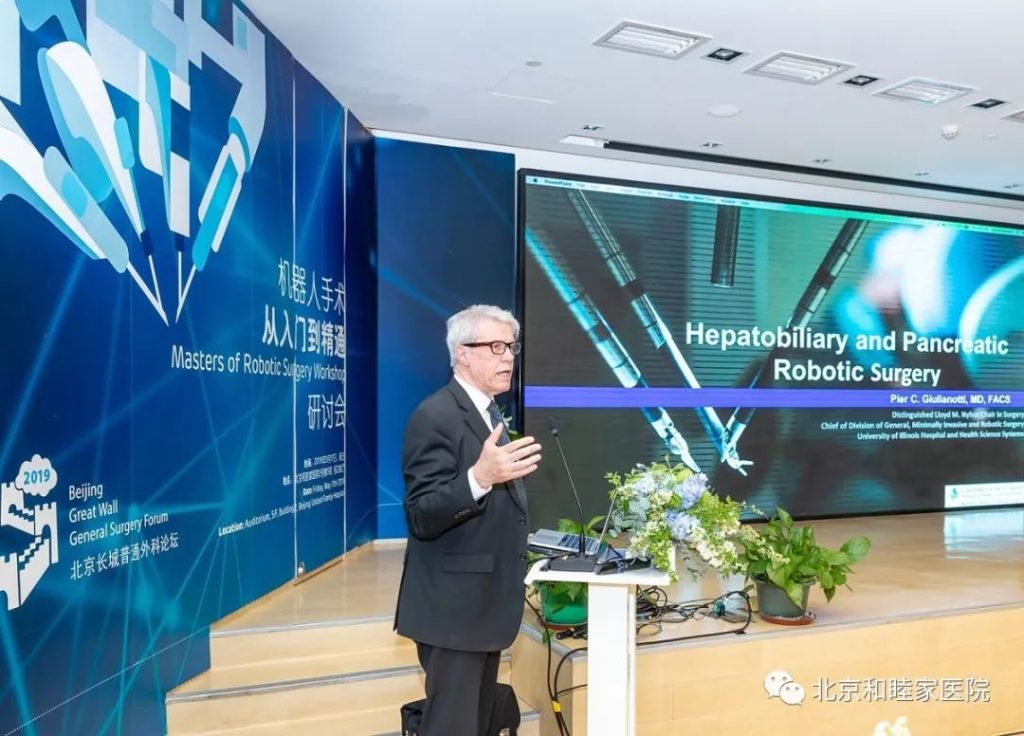
Professor Pier C. Giulianotti
From Elite to Everyone
As the first president of the Clinical Robotic Surgery Association, Professor Giulianotti is also a world-renowned surgical expert in robotic surgery. He has dedicated himself to promoting robotic surgery in the clinical area, and achieved excellence and innovation that is lauded by his peers. BJU has worked closely with the University of Illinois, Professor Giulianotti’s school, in joint technology promotion, development, and training for Da Vinci robotic surgery.
Unlike past discussions of tumor cases, this year’s forum and demonstrations are all about general surgery. Professor Giulianotti told Health World that he’d choose Da Vinci robotic system to do 90% of his surgeries. Chief Dr. Zhu Gang agreed that Da Vinci’s surgical advantages are being more recognized, and more doctors are willing to use this tool. “The most important is that for patients, Da Vinci surgery means smaller incisions, less bleeding, and faster recovery, it is not something open surgery and laparoscopy surgery could compete with.” said Dr. Zhu.
As our economy has rapidly developed, people are considering post-surgical quality of life and aesthetics in addition to healing diseases. At this year’s forum, BJU Da Vinci Robotic Surgical Center opened for operation. Ms. Pan said Da Vinci surgical robots are not limited to tumor treatment. General surgery can use Da Vinci robots to conduct procedures like gastric bypass surgeries as well. The center will help more patients with advanced technology, and attract more excellent medical talents.
After four years of surgery broadcasts, today’s BJU is more restrained in its demonstrations. Ms. Pan said, “From our initial excitement of having ‘experts’ on this platform, today, we hope that the new technology could be used to help more patients.” Currently, Da Vinci robotic surgery is used in most surgical areas at BJU.
“A person feels lucky because they have a choice, and technology can give people more medical choices.” said Ms. Pan.
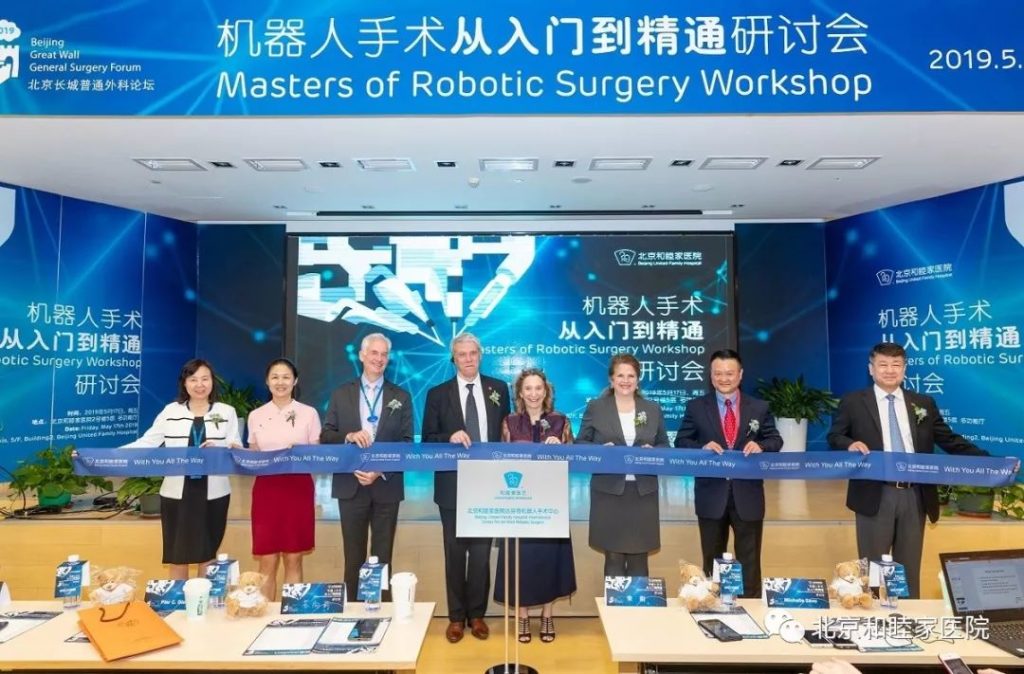
The Unveiling of Beijing UFH Da Vinci Robotic Surgical Center
From Novice to Expert
Introducing the Da Vinci surgical robots was a challenge for the management team as well. Financial budgeting, management of consumables, equipment maintenance, and surgical room maintenance are all issues to be managed.
Chief Zhu said BJU uses a standardized authorization system for its Da Vinci surgical robots. For doctors who have the surgical license but no actual experience, experienced doctors will lead and finish the surgery.
Ms. Pan believes the key challenge is turning doctors’ curiosity about advanced equipment into motivation. Professor Giulianotti’s answer: Da Vinci surgical robots have been increasingly promoted and used around the world in recent years, which has already reached a plateau. There are two reasons for the plateau: one, the fees for robotic surgery are high; two, the training of doctors is an issue, where only the building of a training mechanism will help doctors continue to grow in a steadfast way.
To go from a novice to an expert, the doctor needs to have an understanding of the medical condition as well as mastery of surgical techniques. The key to familiarity of the Da Vinci system is the key to a successful surgery. In order to reduce the learning curve, we need more surgical cases, we need to learn from excellent practitioners, and the Forum at BJU plays this role.
Professor Giulianotti said that, among Chinese doctors today, many have rich surgical knowledge and excellent techniques. The large amount of surgeries has made doctors willing to learn and have the opportunity to use surgical robots, and to continue to rapidly improve skills with the exchange and practice with experts. BJU has used its high medical quality, advanced concepts, language advantage, and other advantages to build an international platform which introduces advanced international technology and shares skills within the industry.
BJU has started working with Beijing Cancer Hospital, Peking Hospital, and other 3A hospitals, providing robotic surgery opportunities for doctors at public hospitals and promoting exchanges and learning. Chief Zhu said, “Being a doctor involves lifelong learning, there needs to be a continued learning ability, and acceptance of new concepts, new knowledge, and new technology to be able to serve our patients better.”
As a private medical organization, BJU has moved from talent import to technology export. Ms. Pan’s building of the surgical team and policy foresight has given the hospital a great foundation. With this solid foundation, more excellent talents have been recruited to the hospital. With the number of young doctors at this Forum, Ms. Pan said that young doctors will herald change. Investing in this group of medical talents is worthwhile, and their training will improve the future of medicine.





